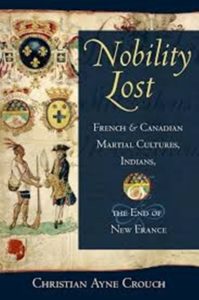Book Review: Nobility Lost
 Submitted by Karl Hele
Submitted by Karl Hele
Christian Ayne Crouch’s Nobility Lost examines how arguments over empire, conflict, and honour during the Seven Years War (1755-1760/3) led to the conquest of New France. Crouch effectively shows how differing codes of martial conduct held by colonial and metropolitan elites clashed and how these martial debates affected the French-Indian alliance, defense of the colony, and post-1763 French colonial enterprises. While Nobility Lost’s focus in on the European, Crouch nicely illustrates how Indigenous peoples affected and were central to the debate surrounding French European martial culture.
According to Crouch, Indigenous methods of war horrified French military elite sensibilities. Indigenous nations, specifically the Ottawa, Abenaki, Huron and Mission Mohawk, as well as the other nations from the pays d’en haut (Great Lakes-Ohio Valley), believed in concepts such as the taking, killing, and gifting of captives; the giving and receiving of gifts; destruction of settler homesteads; and scalping or taking physical trophies from enemies. Adding to the French disquietude was the participation of the Canadian or colonial military readily supporting, engaging, and participating in Indigenous raids, celebrations, and other martial practices. By engaging with the Indians as equals, Canadians were culturally suspect in French eyes. Crouch also deftly shows that each side interpreted victories and defeats differently. Additionally, she shows that Indigenous peoples recognized the difference between French and Canadian officers, particularly when it came to ideas of war. Moreover, Indigenous warriors, Crouch explains, began to question the intelligence of and friendship with the Canadians based on seeming Canadian respect and acquiesce to the French. Thus, according to Crouch, the overall unwillingness of the French Imperial elite to acknowledge Indigenous goals alienated a key ally and led to New France’s collapse. The negative experiences of the French elites created the notion that the colony failed to do cultural corruption and the moral perfidity of savages. The sullying of France’s character by its Canadian colonial led to the expunging the experience from France’s national memory.
If you are interested in Indigenous peoples’ influence on martial cultures of the French and Canadians, as well as how it served as a point of rupture, this monograph is a great read. If you are interested in Indigenous martial culture, this book will disappoint. Nonetheless, Crouch’s work is important to understand the impact of Indigenous people on the development of points of rupture between France and its Canadian colony.
Christian Ayne Crouch. Nobility Lost: French & Canadian Martial Cultures, Indians & the End of New France. Ithaca: Cornell University Press, 2014.


